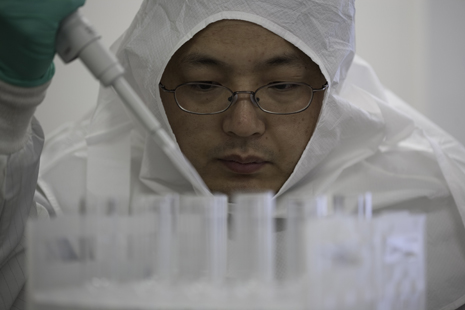University of Arkansas Professor Wins Award From National Science Foundation
FAYETTEVILLE, Ark. – When it comes to rocks and minerals that are millions of years old, University of Arkansas geologist Fangzhen Teng uses a brand new approach to solve the mysteries around their cooling histories. His new approach has earned him a CAREER Award for $458,928 over five years from the National Science Foundation.
Using his knowledge and passion for isotopes, Teng strives to solve some of the mysteries of the formation and evolution of the planet.
One tool he uses is the fractionation of magnesium, which he proposes can be used as three things: “thermometer, speedometer, and as a tracer of crust-mantle interactions.” As magma cools, the isotopes separate based on the differences in atomic mass. The lighter isotopes will form bonds first and crystallize into rocks before the heavier isotopes will. Looking at the ratios of heavy to light isotopes in a given rock allows scientists to determine the temperature at which the rock crystallized.
“Geothermometry” as it is called, has been used for many years in low-temperature processes, such as the formation of carbonates. However, until recently, it was believed that at high temperatures the isotopes mixed together uniformly. The work by Teng and his colleagues proves that isotopes do fractionate at high temperatures.
“In 2008 we had a paper published in Science; we had a huge fractionation of iron. At that time people believed that at high temperature everything was homogenous,” Teng said. “This year we have three papers being published; all of them report large fractionation for magnesium isotopes at high temperatures, so I am pretty sure now people believe that isotopes are fractionated at high temperatures for magnesium.”
Improved technology in recent years allows the instruments that measure the isotopic ratios to reduce the errors, making the high-temperature fractionation measurable.
“We can use magnesium isotopes to calculate how long the crystals have grown from the magma,” he said. With the Hawaii basalts, we can track how long they take to cool because we know when they erupted, but for other rocks we do not have that information. Magnesium isotope fractionation helps scientists determine that property.
Using the isotopic signature as a tracer can allow scientists to determine where in the Earth a rock originated, providing more information about how the planet cooled and the other mechanisms that operate deep below the crust we live on.
The principles can apply not just to our own planet. In theory, magnesium isotope fractionation can be used to determine the age of asteroids and rocks from the Moon as well as other planets.
“By using magnesium isotopes we can know how the Moon formed,” Teng said. “Magnesium isotope fractionation, we believe, can be used to study a lot of processes, but we still know very little about it, which is why we need to study it more.”
The NSF award allows Teng to support one doctoral student for five years, one master’s student for two years, as well as undergraduate students working in the lab. Having students working in the lab is one of the best ways for them to learn how science is accomplished and enables Teng to share his knowledge with the future of the profession.
The award also allows him to focus on groundbreaking research instead of worrying about funding during the five-year duration of the award. Instead, he can focus his time on the research, writing papers about the work accomplished, working with students, and developing this new approach to solve the mysteries of the Earth and solar system.
The NSF Faculty Early Career Development Program aims to encourage and aid in the growth of young professors who have shown exceptional potential in both research and educational settings. By rewarding deserving professors, the National Science Foundation hopes that the faculty members will continue to perform exceptional research and use their knowledge and research to elevate their teaching and educational abilities and effectiveness.
Teng has been a faculty member with the geosciences department in the J. William Fulbright College of Arts and Sciences since 2008. He is also a faculty member of the Arkansas Center for Space and Planetary Sciences.
Topics
Contacts
Fangzhen Teng, assistant professor, geosciences
J. William Fulbright College of Arts and Sciences
479-575-4524,
fteng@uark.edu
William T. Bryan, intern
Office of University Relations
479-575-5555,
wxb004@uark.edu
Headlines
PetSmart CEO J.K. Symancyk to Speak at Walton College Commencement
J.K. Symancyk is an alumnus of the Sam M. Walton College of Business and serves on the Dean’s Executive Advisory Board.
Faulkner Center, Arkansas PBS Partner to Screen Documentary 'Gospel'
The Faulkner Performing Arts Center will host a screening of Gospel, a documentary exploring the origin of Black spirituality through sermon and song, in partnership with Arkansas PBS at 7:30 p.m. Thursday, May 2.
UAPD Officers Mills and Edwards Honored With New Roles
Veterans of the U of A Police Department, Matt Mills has been promoted to assistant chief, and Crandall Edwards has been promoted to administrative captain.
Community Design Center's Greenway Urbanism Project Wins LIV Hospitality Design Award
"Greenway Urbanism" is one of six urban strategies proposed under the Framework Plan for Cherokee Village, a project that received funding through an Our Town grant from the National Endowment for the Arts.
Spring Bike Drive Refurbishes Old Bikes for New Students
All donated bikes will be given to Pedal It Forward, a local nonprofit that will refurbish your bike and return it to the U of A campus to be gifted to a student in need. Hundreds of students have already benefited.





